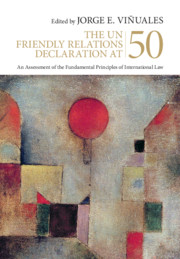 The UN Friendly Relations Declaration at 50
The UN Friendly Relations Declaration at 50 Book contents
- The UN Friendly Relations Declaration at 50
- The UN Friendly Relations Declaration at 50
- Copyright page
- Dedication
- Epigraph
- Contents
- Contributors
- Abbreviations
- Introduction
- 1 The System of the Friendly Relations Declaration
- 2 The Historical Origins and Setting of the Friendly Relations Declaration
- Part I The Principles of the Friendly Relations Declaration
- Part II Fundamental Principles of International Law beyond the Friendly Relations Declaration
- 10 Human Rights Protection as a Principle
- 11 The Fundamental Principles of International Humanitarian Law
- 12 Prevention of Environmental Harm
- 13 Freedoms in Common Areas
- 14 Principles Governing the Global Economy
- 15 The Friendly Relations Declaration at 50
- Appendix The Friendly Relations Declaration (also available at www.un-documents.net/a25r2625.htm)
- Index
15 - The Friendly Relations Declaration at 50
from Part II - Fundamental Principles of International Law beyond the Friendly Relations Declaration
Published online by Cambridge University Press: 21 September 2020
- The UN Friendly Relations Declaration at 50
- The UN Friendly Relations Declaration at 50
- Copyright page
- Dedication
- Epigraph
- Contents
- Contributors
- Abbreviations
- Introduction
- 1 The System of the Friendly Relations Declaration
- 2 The Historical Origins and Setting of the Friendly Relations Declaration
- Part I The Principles of the Friendly Relations Declaration
- Part II Fundamental Principles of International Law beyond the Friendly Relations Declaration
- 10 Human Rights Protection as a Principle
- 11 The Fundamental Principles of International Humanitarian Law
- 12 Prevention of Environmental Harm
- 13 Freedoms in Common Areas
- 14 Principles Governing the Global Economy
- 15 The Friendly Relations Declaration at 50
- Appendix The Friendly Relations Declaration (also available at www.un-documents.net/a25r2625.htm)
- Index
Summary
The invitation to reconsider the principles of the Charter listed in the Friendly Relations Declaration obviously raises a fundamental question. Fifty years after their adoption, are these principles still valid or already obsolete in view of the radical changes affecting the political, technological, economic and social environment in which they had previously been reiterated? Here, we can see all the interest of the constitutionalist theses developed with regard to the Charter of the United Nations, despite the exaggerations to which they may have led. From this point of view, and even if the Charter can in no way be reduced to the content of the Declaration itself, the reconsideration of the latter already raises the question of whether the world should radically change its global political constitution. We can see that it is difficult to respond lightly in a positive way! On the contrary, everything points to a response on the basis of two proposals: on the one hand, the nature and scale of the problems facing not only the society of States but also humanity as a whole provides a strong encouragement to reaffirm the need to respect, in particular, the seven principles enshrined in the Declaration as well as in the Charter as a whole; on the other hand, we are no longer in 1970 and each of these principles must be completed and reinterpreted in the light of the new challenges facing the entire international community, which is composed not only of States but also of the different components of civil society.
- Type
- Chapter
- Information
- The UN Friendly Relations Declaration at 50An Assessment of the Fundamental Principles of International Law, pp. 362 - 370Publisher: Cambridge University PressPrint publication year: 2020


